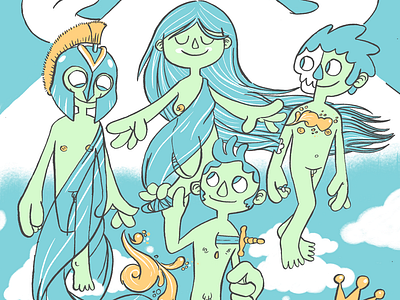antigone raising to the skies
Antigone is the subject of a story in which she attempts to secure a respectable burial for her brother Polynices. Oedipus's sons, Eteocles and Polynices, had shared the rule jointly until they quarrelled, and Eteocles expelled his brother. In Sophocles' account, the two brothers agreed to alternate rule each year, but Eteocles decided not to share power with his brother after his tenure expired. Polynices left the kingdom, gathered an army and attacked the city of Thebes in a conflict called the Seven Against Thebes. Both brothers were killed in the battle.
King Creon, who has ascended to the throne of Thebes after the death of the brothers, decrees that Polynices is not to be buried or even mourned, on pain of death by stoning. Antigone, Polynices' sister, defies the king's order but is caught.
In the oldest version of the story, the burial of Polynices takes place during Oedipus' reign in Thebes, before Oedipus marries his mother, Jocasta. However, in other versions such as Sophocles' tragedies Oedipus at Colonus and Antigone, it occurs in the years after the banishment and death of Oedipus and Antigone's struggles against Creon.
Antigone is brought before Creon, and admits that she knew of Creon's law forbidding mourning for Polynices but chose to break it, claiming the superiority of divine over human law, and she defies Creon's cruelty with courage, passion and determination.
Sophocles' Antigone ends in disaster. Creon orders Antigone buried alive in a tomb. Although Creon has a change of heart and tries to release Antigone, he finds she has hanged herself. Creon's son Haemon, who was in love with Antigone commits suicide with a knife, and his mother Queen Eurydice, also kills herself in despair over her son's death. She has been forced to weave throughout the entire story, and her death alludes to The Fates.
Sophocles' play is a typical Greek tragedy, in which inherent flaws of the acting characters lead to irrevocable disaster. Antigone and Creon are prototypical tragic figures in an Aristotelian sense, as they struggle towards their fore-doomed ends, forsaken by the gods.
